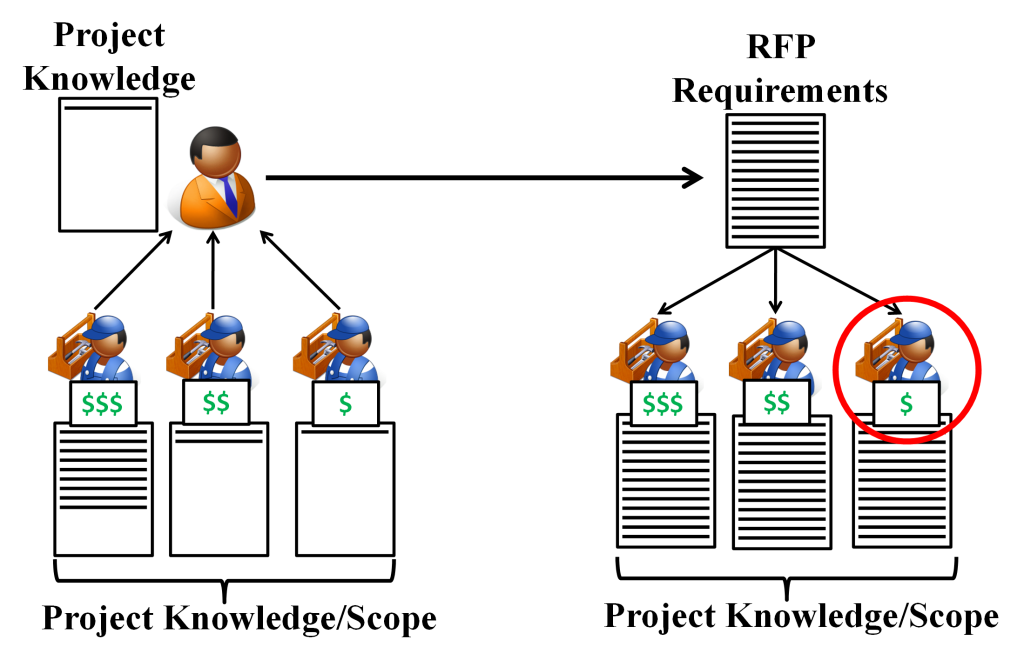
05 Jan Procurement Tip: How Buyers can Outsource and Procure a Service They Know Nothing About
Today’s procurement tip is on how buyers can outsource and procure something they know nothing about. As technology advances, buyers do not have enough time and resources to be an expert in everything they procure. The range of services an organization needs is too wide to handle, from janitorial, software, construction, or simple office supplies. Even if buyers attempt to hire the needed subject matter experts in-house, due to the pace of technology, their in-house subject matter experts will normally have outdated knowledge compared to expert vendors who actively work within the field and multiple clients daily.
Some buyers have resorted to hiring consultants instead. This has its own problems—you still run into the same issue of how you hire an expert consultant in a field you know nothing about. Consultants only add a layer of administrative expenses to any service they assist in. Luckily, there is a well-proven method to how buyers can procure a service with no expertise.
Why Do You Need to be the Expert?
Why would you need to be the expert in the first place? Aren’t you hiring someone because you don’t want to acquire the expertise yourself? Often, a client’s response is that they need internal expertise to write the requirement or project scope so the vendors know what they are competing for and what to do. That brings more questions. Does it make sense to hire an expert and tell them how to do their job? Even when you have some expertise as a buyer, shouldn’t the vendor you hire have more expertise than you? Wouldn’t the expert vendor be able to provide a better scope and solution than you? When you stop and ask yourself the right questions, you will see that it makes little sense that the buyer would need expertise in the services they procure.
Beware of Request for Information and Competitive Dialogues.
When clients feel they lack enough knowledge to create a sufficient project requirement, they often go out to their vendor pool to help create their requirement. This is done through a request for information (RFI) or competitive dialogue in which the clients will interview vendors in person about the project. Although this practice may seem logical, it is detrimental to both the client and vendor. When a client requests information from the vendor, they don’t realize that each vendor has a different understanding of the project and scope. Due to their varying levels of knowledge some may cost more as they are all offering a different solution and scope based on their understanding. The client will then collect all the information they were given by all the vendors and create a very detailed RFP requirement outlining everything they want included, some of which might not be necessary. When they send their completed RFP to the vendors, they make the mistake of believing that since they [the buyer] outlined their requirement in detail, all the vendors now understand and can perform everything written in the requirement. With this belief, they now assume all vendors are the same and select the lowest price, as price is now the only differentiator. Essentially, what the clients have now done is given the nonexpert the ability to compete and appear to be experts. They have stolen all the good ideas from experts and given it to nonexperts. However, after the contract is signed and the project is underway, the client will discover that what is in the requirement does not change the capability and understanding of a vendor who does not understand. To read more of the dangers of this practice, see the previous Procurement Tip: The Pitfalls of Overprescribed RFPs.
 How to Write a Requirement with no Expertise in the Area
How to Write a Requirement with no Expertise in the Area
Since we are looking to select an expert vendor, the client does not have to spend any time writing the solution. The client’s main objective in writing their requirement is to identify the problem they would like solved and any limitations or conditions that the proposed solution must consider. This can all be done in less than two pages and one week.
If you want to help an expert create the best solution for you, the most important thing you need are the key project metrics which give context as to the limitations and conditions of the project. This could include:
- Budget
- Dates such as employee holidays or deadlines
- Size of the scope of services in terms of numbers of employees, transactions, or materials
- Unique conditions: company policies, mandatory preferences, or strategic goals
- Documents: drawings/designs, building layouts, previous contracts and service levels
For example, here are two requirement statements we have simplified in the past for clients:
- The City of Powell issues this RFP to request proposals for the janitorial services of 19 facilities, budget: $353,557. The cleanliness levels expected are Level 3 based on APPA standards for facilities. All facility information is provided including building size (sq ft) / cleaning area (sq ft), # of floors, restrooms, and special notes.
- Company A is procuring an ERP software program with the objective of replacing the independent business operation’s current manual and semi-automated systems with a single system. The conditions of the ERP program must satisfy are: 10 sites, 3,500 regular staff, 20,000 transactions per month, 2 FTE for maintenance of system, $5.5 M budget, 2 legacy systems, and 8 major functions [payroll, timekeeping, etc.]
For further reading in the logic and process in doing so see previous procurement tips:
- Procurement Tip: The Pitfalls of Overprescribed RFP
- Procurement Tip: The Pitfalls of Minimum Standards
How to Compare and Select the Best Vendor with no Expertise in the Area
A key trait in experts is their ability to make things simple. Likewise, as the vendor is relaying their expertise and proposal to the client, it should not require the client to be an expert. Everything should be simple—if it’s not simple, you most likely do not have an expert. Furthermore, by creating a structure which prioritizes simple, non-technical claims and substantiation of performance, the buyer’s selection committee does not need any technical expertise in the area to rate and score proposals.
For further reading in how vendors are expected to show their expertise and proposal in a simple manner see previous procurement tips:
A Process that Allows you to Procure any Service
The Best Value Approach (BVA) is a procurement and project management process which identifies and utilizes experts. The BVA process due to its structure allows procurement offers to procure services which they have no expertise in. Through a maximum of 6 pages per proposal and one interview, the BVA allows clients to identify an expert vendor then provides a complete solution for the client before the contract is even signed!
To learn more about the Best Value Approach see:
- Free membership for latest tips and news: https://pbsrg.com/membership/
- For latest books, events, and licensed partners: https://pbsrg.com/resources/
- Latest BVA journal publications: www.cibw117.org/
- Annual Best Value Conference in January: https://bestvalueconference.ksm-inc.com/
- Latest presentations and videos: https://www.youtube.com/channel/UCxBi26nXLDTqG4ZRV6p0iiQ


